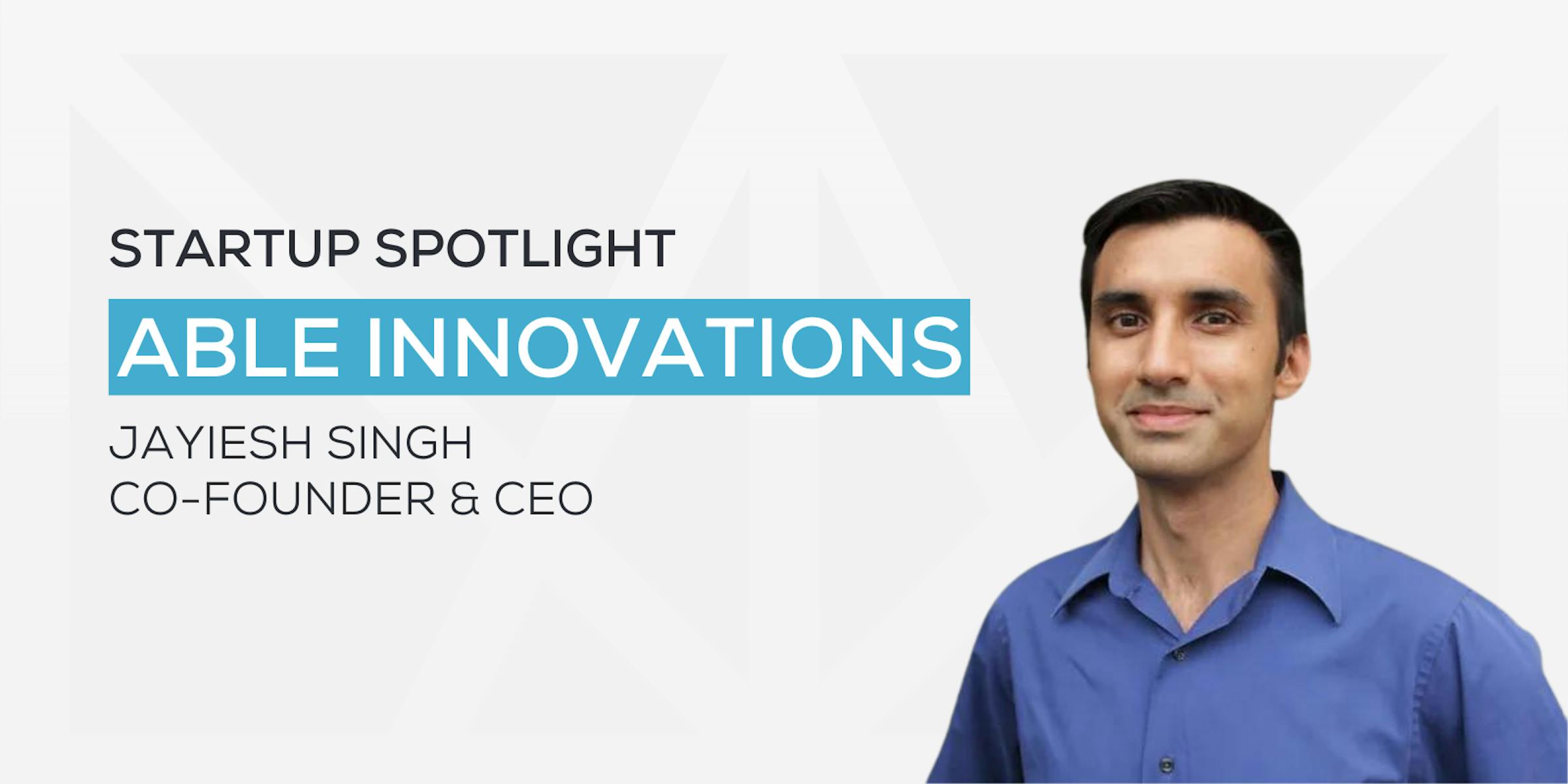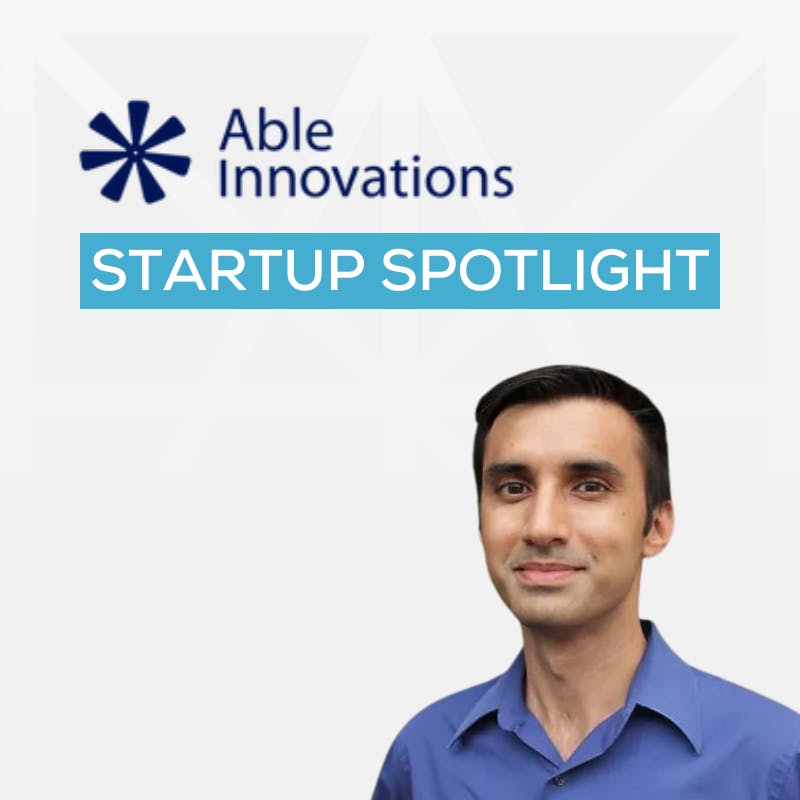MATTER Startup Spotlight: Able Innovations
Redefining the standard of care in patient transfers
According to the National Library of Medicine, heavy lifting is the most significant risk factor for nurses for the development of musculoskeletal injuries, particularly in the lower back. Low back pain is even more common in healthcare than in construction and manufacturing — two industries often thought of as dangerous. At the same time, the Bureau of Labor Statistics anticipates the nursing shortage to reach 1.1 million nurses by the end of 2022.
Enter Able Innovations, a MATTER startup. Founded by Jayiesh Singh, Able Innovations has developed a device that enables frontline healthcare workers to laterally transfer patients with the push of a button, eliminating the physical burden on staff while simultaneously saving them time. Read on to learn more about the Able Innovations solution and Jayiesh’s entrepreneurial journey.
Responses have been edited for length and clarity.
MATTER: Tell me about the Able Innovations solution.
Jayiesh: At Able Innovations, we believe that frontline staff enter the profession to provide compassionate care; so, we have a vision to improve their quality of life by taking away their most labor-intensive tasks. Our first solution is the ALTA Platform™ that automates lateral patient transfers, which is the act of moving individuals from one surface to another, keeping them in a lying down position.
Imagine someone is unconscious in a hospital or undergoing a procedure. Previously, patient transfers required between two to eight staff, depending on the patient’s stature and weight, exerting back-breaking effort to do a heave-ho or put them on a mechanical lifting machine. The ALTA Platform does everything; with the push of a button, it prepares itself to conduct the transfer, extends out its platform, compresses the mattress, rolls under the patient and shuttles them onto ALTA’s supporting surface.
Our robotic technology provides a significant amount of independence and saves frontline staff’s time while simultaneously making the process much safer as they no longer have to overexert themselves, leading to longer careers and less burnout.
MATTER: What makes Able Innovations different from other solutions on the market?
Jayiesh: I’m not from the medical device industry — my background is in solar robotics — but I also spent a lot of time in long-term care. When I started researching the long-term care space, I saw that the technology and methods to transfer patients and patient handling hadn’t evolved in the last 50 or 60 years. It’s not known as a high-tech or innovative sector, but I saw the writing on the wall that there would be imminent short-staffing when looking at our aging demographic.
Now, the status quo for patient transfers is shoving low-friction plastic sheets under a person and two to eight staff shuttling them from one surface to another. It requires a lot of coordination and backbreaking effort. The other solutions in the market are mechanical lifting devices similar to cranes that are motorized but still require multiple staff to safely operate and are very cumbersome. Over the last few decades, we’ve seen people try to automate transfers to some degree, but their solutions were highly technical and required a specific technician to operate.
What makes us special compared to other solutions is that frontline staff can intuitively operate this device at the push of a button. The device has a myriad of sensors that monitor the situation, so we’ve spent a lot of time developing the user interface to make it easy for staff to interact with. We’re truly one of the only technologies, if not the only technology, that allows safe transfers with one attending caregiver.
MATTER: What is the Able Innovations story? How did you come up with this solution?
Jayiesh: It’s a convergence of two stories in my life: one professional, one personal. Professionally, I’ve always wanted to use tech for good. I put my services toward the solar industry and helped solve the energy problem by developing robots that would allow solar panels to follow the sun to get more energy out of them. For eight years, I designed and manufactured them then moved to the business and sales side.
At the same time, I have an affinity for working with older adults. My mom works with older adults, so I’ve always volunteered in long-term care, and I’ve been privileged to have insights into this world. I’ve seen the challenges the patients, residents and caregivers face. For example, I’ve seen my mom get injured while moving a patient because she didn’t have enough help. She’s dislocated her shoulder and has chronic injuries — and that’s not only her story but the story of many.
On the patient and resident side, they didn’t want to be moved that way; it made them feel highly undignified. Around 2016-2017, I had an aha moment that this is an automation challenge: it happens hundreds of times every single day and requires a lot of labor, with less and less labor available.
I wanted to automate this problem and bring technology into it. I started Able Innovations in 2018 along with my co-founder, Philip Chang, who had spent a lot of time in healthcare facilities and been the transferee. We’d worked in previous ventures together developing products, so we knew it was a perfect match. When the COVID-19 pandemic hit, we realized our hypothesis of short-staffing would accelerate, making our solution very timely.
MATTER: What milestones have you reached thus far?
Jayiesh: Most recently, we are at the cusp of closing our first commercial sales. We had a public procurement for our solution that we cleared, and we’re finishing the contracting phase. We’ve also made significant inroads with the U.S. Veterans Health Administration (VA), which I credit MATTER, primarily, for starting and facilitating that relationship in its early stages.
Over the last year and a quarter, we’ve been collaborating with seven of the VA’s facilities to fine-tune our product so that frontline staff really love it. One great moment we had was when we took our product to the Orlando VA, and about 150 of their staff showed up. It felt like a rockstar moment with our product on the stage of their main auditorium and everybody from all levels came in just to see the device. Having ongoing and progressing conversations with one of the largest U.S. health systems is a huge milestone for us.
A few additional recent achievements are registering with the FDA and raising about $6 million at the beginning of 2022: half from investors, half from government funding. Right now, we are seeing unprecedented demand for technology like ours, and we’re looking to meet our next most significant milestone which is to get the right investors behind us to help scale our technology, manufacturing and operations so we can build this as a standard of care.
MATTER: What is your background, and how did it prepare you for entrepreneurship?
Jayiesh: Professionally, it feels like I’ve been getting a 12-year degree on starting a company. I joined a solar startup that was in its infancy and received amazing funding and had great people, and I learned so much along the way. Developing hardware is extremely difficult, especially in robotics, when mistakes can cost millions of dollars; you can’t just replace or upgrade your product instantly, multiplying the effects of the mistake. My experience at this startup was extremely crucial in order to be successful with Able Innovations.
My previous experience prepared me quite well for the difficulties of hardware, such as supply chain challenges. For example, before it was announced in the news, we ordered a ton of microprocessors before they went out of market, and now we are stocked up on them.
Also, in 2016, Phil and I started our own consulting business for startups called Envest. We didn’t yet have our ideas formulated to start our own companies, so we wanted to leverage our experience to help other companies scale and manufacture promising and complicated products in a cost- and time-efficient manner. We helped companies that were developing products like exoskeletons for kids and robots that would sense how many assets were in a building, all the way from toilet paper to soap.
We played a crucial part in helping companies develop and scale more than eight products. We saw different styles of management and capitalization, giving us a great thesis in understanding what’s successful and what’s not from a business perspective. And because of the work we were doing with Envest, we built a great network and were able to bootstrap Able Innovations.
On the personal side, I’ve always been highly driven by empathy. It’s one of our team’s strong suits; everyone on our team can empathize with the problem. Many of our team members have relatives who’ve experienced dignity issues when it comes to being transferred or moved within a healthcare facility. There are a lot of challenges that startups face, but we can overcome those with empathy. We find that extra bit of motivation from relating to the frontline staff and patients. All we need to do is go into a facility that’s using our device to be inspired.
“We find that extra bit of motivation from relating to the frontline staff and patients. All we need to do is go into a facility that’s using our device to be inspired.”
MATTER: From all your experience, do you have any advice you would give to entrepreneurs who may just be starting out?
Jayiesh: I’ll start off by saying I’m by no means an authority, and I’ve seen various approaches and journeys work out. The common themes for success I’ve seen are persistence and being available to receive luck when going after a goal. For example, when looking for investors, we had a conviction on which ones would be the right investors for us. But the investors’ first line to us was: “We don’t invest in companies like this.”
Every investor on our table right now said that to me in our early conversations, highlighting that you need to be persistent, understand people’s concerns and not give up. That’s how we’ve turned naysayers into champions. Those are also qualities I’ve seen with a lot of companies that succeed. So especially right now, when times are difficult and VCs may be painting a doom and gloom picture, it’s critical for founders to be persistent and weather the storm.
MATTER: What value have you gained from being part of the MATTER community?
Jayiesh: We are a Canadian company that aims to primarily sell products in the U.S., and we believe that our future investors are going to be from the U.S. We set up and grew during the pandemic, and our network was nearly absent in the U.S. We were fortunate enough to be selected for the Canada-Chicago Mentoring Program (C2MP) that’s run as a collaboration between the Canadian Trade Commission and MATTER. The program opened massive opportunities for us that are aligned with what we want to be in the future.
From meeting with investors to meeting with potential customers, we’ve developed some transformative relationships, such as with the VA and key advisors like Kevin Donnelley. Kevin is a MATTER mentor, and he now represents us at sales and marketing events. Furthermore, MATTER brings together highly relevant ecosystem partners in the med tech field which is quite rare and absolutely fantastic. Participating in C2MP has resulted in our business being further along, our team thinking bigger picture and meeting our goals more efficiently. When I do stumble, I go to advisors in the MATTER community to help me solve the problems I’m facing.
“When I do stumble, I go to advisors in the MATTER community to help me solve the problems I’m facing.”
About Able Innovations
Able Innovations is solving the painful and labor-intensive process of patient transfers through technology that enables effortless, hands-free, safe and dignified transfers. With the ALTA Platform, a single operator can transfer supine individuals laterally — e.g.: bed to stretcher or imaging table — effortlessly and automatically.
About MATTER
At MATTER, we believe collaboration is the best way to improve healthcare. The MATTER collaborative includes more than 700 current and alumni startups from around the world, working together with dozens of hospitals and health systems, universities and industry-leading companies to build the future of healthcare. Together we are accelerating innovation, advancing care and improving lives. For more information, visit matter.health and follow @MATTERhealth.




